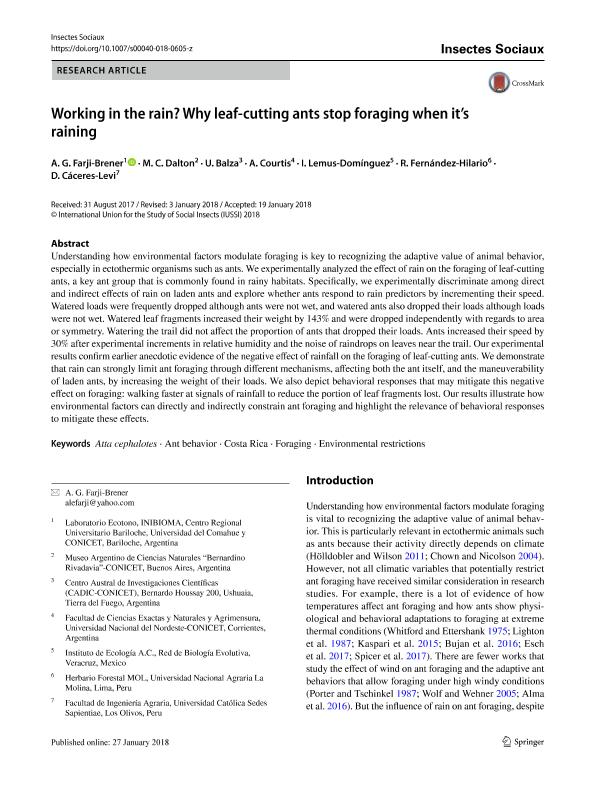Artículo
Working in the rain? Why leaf-cutting ants stop foraging when it’s raining
Farji Brener, Alejandro Gustavo ; Dalton, María Cecilia
; Dalton, María Cecilia ; Balza, Ulises
; Balza, Ulises ; Courtis, Azul Celeste
; Courtis, Azul Celeste ; Lemus Domínguez, I.; Fernández Hilario, R.; Cáceres Levi, D.
; Lemus Domínguez, I.; Fernández Hilario, R.; Cáceres Levi, D.
 ; Dalton, María Cecilia
; Dalton, María Cecilia ; Balza, Ulises
; Balza, Ulises ; Courtis, Azul Celeste
; Courtis, Azul Celeste ; Lemus Domínguez, I.; Fernández Hilario, R.; Cáceres Levi, D.
; Lemus Domínguez, I.; Fernández Hilario, R.; Cáceres Levi, D.
Fecha de publicación:
05/2018
Editorial:
Birkhauser Verlag Ag
Revista:
Insectes Sociaux
ISSN:
0020-1812
e-ISSN:
1420-9098
Idioma:
Inglés
Tipo de recurso:
Artículo publicado
Clasificación temática:
Resumen
Understanding how environmental factors modulate foraging is key to recognizing the adaptive value of animal behavior, especially in ectothermic organisms such as ants. We experimentally analyzed the effect of rain on the foraging of leaf-cutting ants, a key ant group that is commonly found in rainy habitats. Specifically, we experimentally discriminate among direct and indirect effects of rain on laden ants and explore whether ants respond to rain predictors by incrementing their speed. Watered loads were frequently dropped although ants were not wet, and watered ants also dropped their loads although loads were not wet. Watered leaf fragments increased their weight by 143% and were dropped independently with regards to area or symmetry. Watering the trail did not affect the proportion of ants that dropped their loads. Ants increased their speed by 30% after experimental increments in relative humidity and the noise of raindrops on leaves near the trail. Our experimental results confirm earlier anecdotic evidence of the negative effect of rainfall on the foraging of leaf-cutting ants. We demonstrate that rain can strongly limit ant foraging through different mechanisms, affecting both the ant itself, and the maneuverability of laden ants, by increasing the weight of their loads. We also depict behavioral responses that may mitigate this negative effect on foraging: walking faster at signals of rainfall to reduce the portion of leaf fragments lost. Our results illustrate how environmental factors can directly and indirectly constrain ant foraging and highlight the relevance of behavioral responses to mitigate these effects.
Palabras clave:
ANT BEHAVIOR
,
ATTA CEPHALOTES
,
COSTA RICA
,
ENVIRONMENTAL RESTRICTIONS
,
FORAGING
Archivos asociados
Licencia
Identificadores
Colecciones
Articulos(CADIC)
Articulos de CENTRO AUSTRAL DE INVESTIGACIONES CIENTIFICAS
Articulos de CENTRO AUSTRAL DE INVESTIGACIONES CIENTIFICAS
Articulos(CCT - NORDESTE)
Articulos de CTRO.CIENTIFICO TECNOL.CONICET - NORDESTE
Articulos de CTRO.CIENTIFICO TECNOL.CONICET - NORDESTE
Articulos(INIBIOMA)
Articulos de INST. DE INVEST.EN BIODIVERSIDAD Y MEDIOAMBIENTE
Articulos de INST. DE INVEST.EN BIODIVERSIDAD Y MEDIOAMBIENTE
Articulos(MACNBR)
Articulos de MUSEO ARG.DE CS.NAT "BERNARDINO RIVADAVIA"
Articulos de MUSEO ARG.DE CS.NAT "BERNARDINO RIVADAVIA"
Citación
Farji Brener, Alejandro Gustavo; Dalton, María Cecilia; Balza, Ulises; Courtis, Azul Celeste; Lemus Domínguez, I.; et al.; Working in the rain? Why leaf-cutting ants stop foraging when it’s raining; Birkhauser Verlag Ag; Insectes Sociaux; 65; 2; 5-2018; 233-239
Compartir
Altmétricas



